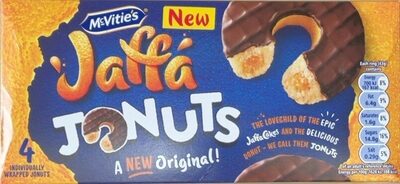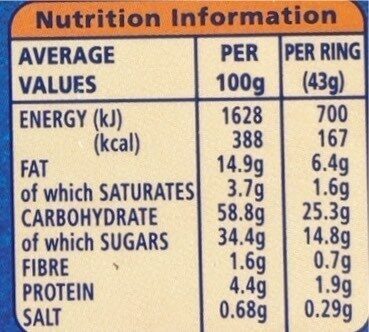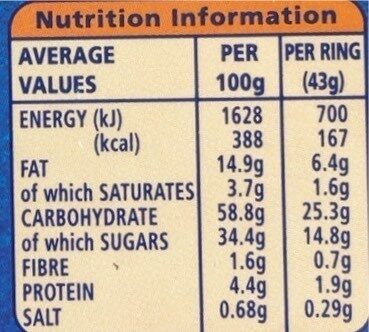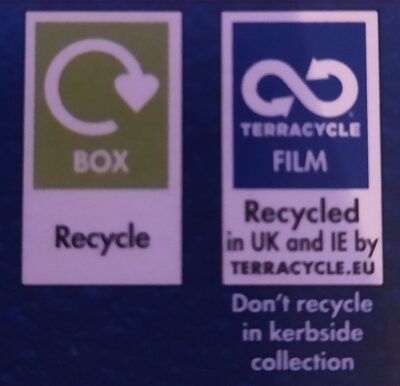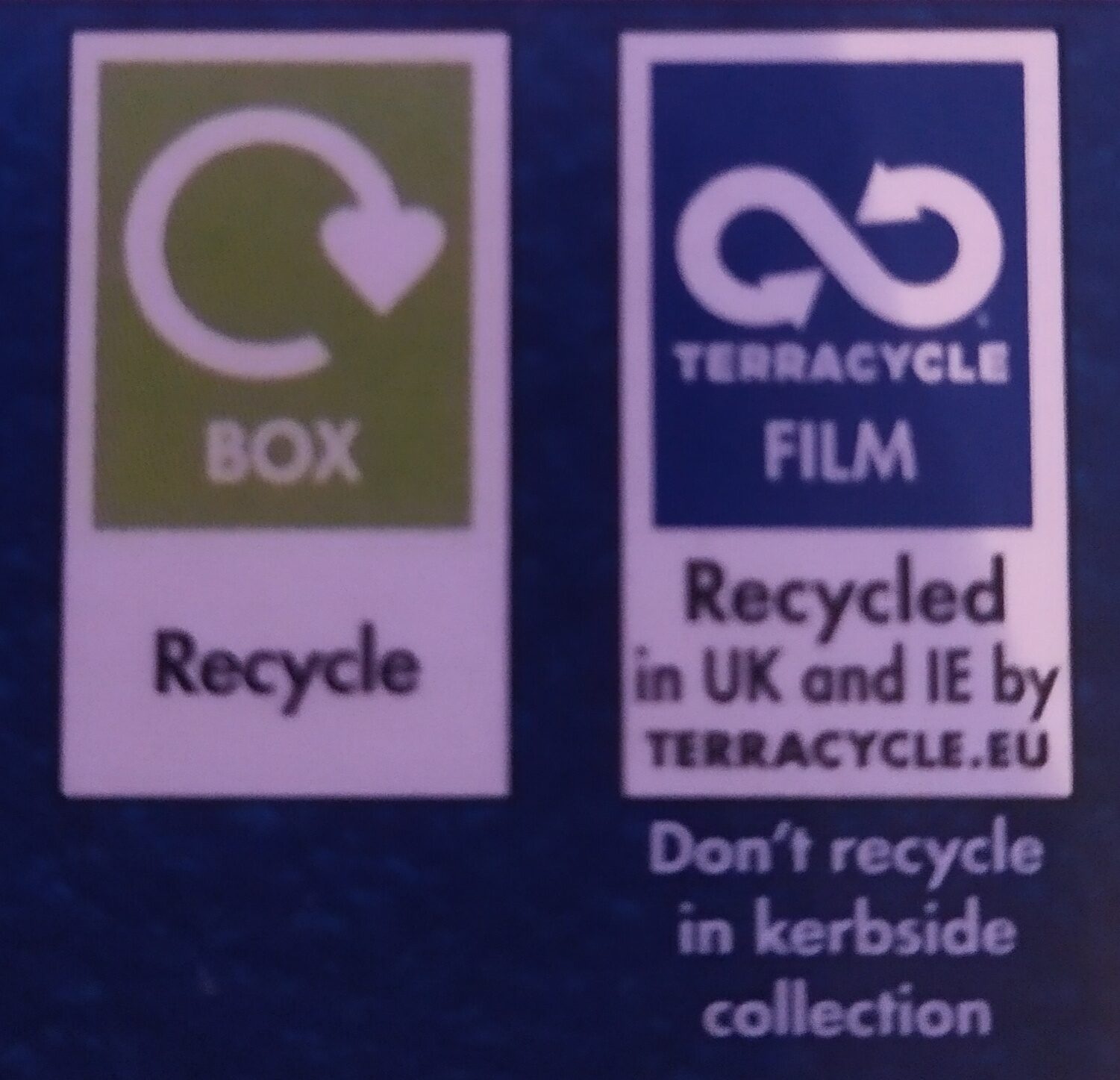Help us make food transparency the norm!
As a non-profit organization, we depend on your donations to continue informing consumers around the world about what they eat.
The food revolution starts with you!
Jaffa Jonuts - McVities - 4 x 43 g
Jaffa Jonuts - McVities - 4 x 43 g
This product page is not complete. You can help to complete it by editing it and adding more data from the photos we have, or by taking more photos using the app for Android or iPhone/iPad. Thank you!
×
Barcode: 5000168027395 (EAN / EAN-13)
Quantity: 4 x 43 g
Packaging: Card-carton, Mixed plastic film-packet
Categories: Snacks, Sweet snacks, Biscuits and cakes, Cakes, Chocolate cakes
Labels, certifications, awards: Vegetarian
Countries where sold: United Kingdom
Matching with your preferences
Health
Ingredients
-
54 ingredients
Orange Flavoured Filling 21% (Sugar, Water, Glucose Syrup, Dextrose, Invert Sugar Syrup, Concentrated Orange Juice, Stabiliser (Pectin), Acidity Regulators (Citric Acid, Sodium Citrates), Natural Orange Flavouring, Preservative (Potassium Sorbate), Colour (Paprika Extract)), Wheat Flour, Dark Chocolate 14% (Sugar, Cocoa Mass, Vegetable Fats (Palm, Shea), Butter Oil (Milk), Cocoa Butter, Emulsifiers (Soya Lecithin, E476), Natural Flavouring), Water, Sugar, Vegetable Oil (Sunflower), Humectants (Glycerine, Sorbitol), Glucose Syrup, Whole Egg, Starch, Dried Whey (Milk), Emulsifiers (E481, E477, E471, E475), Raising Agents (Disodium Diphosphate, Sodium Bicarbonate), Salt, Natural Orange Flavouring, Invert Sugar Syrup, Preservatives (Sorbic Acid, Potassium Sorbate).Allergens: Eggs, Gluten, Milk, SoybeansTraces: Nuts, Sesame seeds
Food processing
-
Ultra processed foods
Elements that indicate the product is in the 4 - Ultra processed food and drink products group:
- Additive: E160c - Paprika extract
- Additive: E322 - Lecithins
- Additive: E420 - Sorbitol
- Additive: E422 - Glycerol
- Additive: E440 - Pectins
- Additive: E450 - Diphosphates
- Additive: E471 - Mono- and diglycerides of fatty acids
- Additive: E475 - Polyglycerol esters of fatty acids
- Additive: E476 - Polyglycerol polyricinoleate
- Additive: E477 - Propane-1‚2-diol esters of fatty acids
- Additive: E481 - Sodium stearoyl-2-lactylate
- Ingredient: Colour
- Ingredient: Dextrose
- Ingredient: Emulsifier
- Ingredient: Flavouring
- Ingredient: Glucose
- Ingredient: Glucose syrup
- Ingredient: Humectant
- Ingredient: Invert sugar
- Ingredient: Whey
Food products are classified into 4 groups according to their degree of processing:
- Unprocessed or minimally processed foods
- Processed culinary ingredients
- Processed foods
- Ultra processed foods
The determination of the group is based on the category of the product and on the ingredients it contains.
Additives
-
E200 - Sorbic acid
Sorbic acid: Sorbic acid, or 2‚4-hexadienoic acid, is a natural organic compound used as a food preservative. It has the chemical formula CH3-CH-4CO2H. It is a colourless solid that is slightly soluble in water and sublimes readily. It was first isolated from the unripe berries of the Sorbus aucuparia -rowan tree-, hence its name.Source: Wikipedia
-
E202 - Potassium sorbate
Potassium sorbate (E202) is a synthetic food preservative commonly used to extend the shelf life of various food products.
It works by inhibiting the growth of molds, yeast, and some bacteria, preventing spoilage. When added to foods, it helps maintain their freshness and quality.
Some studies have shown that when combined with nitrites, potassium sorbate have genotoxic activity in vitro. However, potassium sorbate is generally recognized as safe (GRAS) by regulatory authorities.
-
E322 - Lecithins
Lecithins are natural compounds commonly used in the food industry as emulsifiers and stabilizers.
Extracted from sources like soybeans and eggs, lecithins consist of phospholipids that enhance the mixing of oil and water, ensuring smooth textures in various products like chocolates, dressings, and baked goods.
They do not present any known health risks.
-
E322i - Lecithin
Lecithins are natural compounds commonly used in the food industry as emulsifiers and stabilizers.
Extracted from sources like soybeans and eggs, lecithins consist of phospholipids that enhance the mixing of oil and water, ensuring smooth textures in various products like chocolates, dressings, and baked goods.
They do not present any known health risks.
-
E330 - Citric acid
Citric acid is a natural organic acid found in citrus fruits such as lemons, oranges, and limes.
It is widely used in the food industry as a flavor enhancer, acidulant, and preservative due to its tart and refreshing taste.
Citric acid is safe for consumption when used in moderation and is considered a generally recognized as safe (GRAS) food additive by regulatory agencies worldwide.
-
E331 - Sodium citrates
Sodium citrate: Sodium citrate may refer to any of the sodium salts of citrate -though most commonly the third-: Monosodium citrate Disodium citrate Trisodium citrateThe three forms of the salt are collectively known by the E number E331. Sodium citrates are used as acidity regulators in food and drinks, and also as emulsifiers for oils. They enable cheeses to melt without becoming greasy.Source: Wikipedia
-
E420 - Sorbitol
Sorbitol: Sorbitol --, less commonly known as glucitol --, is a sugar alcohol with a sweet taste which the human body metabolizes slowly. It can be obtained by reduction of glucose, which changes the aldehyde group to a hydroxyl group. Most sorbitol is made from corn syrup, but it is also found in nature, for example in apples, pears, peaches, and prunes. It is converted to fructose by sorbitol-6-phosphate 2-dehydrogenase. Sorbitol is an isomer of mannitol, another sugar alcohol; the two differ only in the orientation of the hydroxyl group on carbon 2. While similar, the two sugar alcohols have very different sources in nature, melting points, and uses.Source: Wikipedia
-
E422 - Glycerol
Glycerol: Glycerol -; also called glycerine or glycerin; see spelling differences- is a simple polyol compound. It is a colorless, odorless, viscous liquid that is sweet-tasting and non-toxic. The glycerol backbone is found in all lipids known as triglycerides. It is widely used in the food industry as a sweetener and humectant and in pharmaceutical formulations. Glycerol has three hydroxyl groups that are responsible for its solubility in water and its hygroscopic nature.Source: Wikipedia
-
E440 - Pectins
Pectins (E440) are natural carbohydrates, predominantly found in fruits, that act as gelling agents in the food industry, creating the desirable jelly-like texture in jams, jellies, and marmalades.
Pectins stabilize and thicken various food products, such as desserts, confectioneries, and beverages, ensuring a uniform consistency and quality.
Recognized as safe by various health authorities, pectins have been widely used without notable adverse effects when consumed in typical dietary amounts.
-
E450 - Diphosphates
Diphosphates (E450) are food additives often utilized to modify the texture of products, acting as leavening agents in baking and preventing the coagulation of canned food.
These salts can stabilize whipped cream and are also found in powdered products to maintain their flow properties. They are commonly present in baked goods, processed meats, and soft drinks.
Derived from phosphoric acid, they're part of our daily phosphate intake, which often surpasses recommended levels due to the prevalence of phosphates in processed foods and drinks.
Excessive phosphate consumption is linked to health issues, such as impaired kidney function and weakened bone health. Though diphosphates are generally regarded as safe when consumed within established acceptable daily intakes, it's imperative to monitor overall phosphate consumption to maintain optimal health.
-
E471 - Mono- and diglycerides of fatty acids
Mono- and diglycerides of fatty acids (E471), are food additives commonly used as emulsifiers in various processed foods.
These compounds consist of glycerol molecules linked to one or two fatty acid chains, which help stabilize and blend water and oil-based ingredients. E471 enhances the texture and shelf life of products like margarine, baked goods, and ice cream, ensuring a smooth and consistent texture.
It is generally considered safe for consumption within established regulatory limits.
-
E476 - Polyglycerol polyricinoleate
Polyglycerol polyricinoleate: Polyglycerol polyricinoleate -PGPR-, E476, is an emulsifier made from glycerol and fatty acids -usually from castor bean, but also from soybean oil-. In chocolate, compound chocolate and similar coatings, PGPR is mainly used with another substance like lecithin to reduce viscosity. It is used at low levels -below 0.5%-, and works by decreasing the friction between the solid particles -e.g. cacao, sugar, milk- in molten chocolate, reducing the yield stress so that it flows more easily, approaching the behaviour of a Newtonian fluid. It can also be used as an emulsifier in spreads and in salad dressings, or to improve the texture of baked goods. It is made up of a short chain of glycerol molecules connected by ether bonds, with ricinoleic acid side chains connected by ester bonds. PGPR is a yellowish, viscous liquid, and is strongly lipophilic: it is soluble in fats and oils and insoluble in water and ethanol.Source: Wikipedia
-
E481 - Sodium stearoyl-2-lactylate
Sodium stearoyl lactylate: Sodium stearoyl-2-lactylate -sodium stearoyl lactylate or SSL- is a versatile, FDA approved food additive used to improve the mix tolerance and volume of processed foods. It is one type of a commercially available lactylate. SSL is non-toxic, biodegradable, and typically manufactured using biorenewable feedstocks. Because SSL is a safe and highly effective food additive, it is used in a wide variety of products ranging from baked goods and desserts to pet foods.As described by the Food Chemicals Codex 7th edition, SSL is a cream-colored powder or brittle solid. SSL is currently manufactured by the esterification of stearic acid with lactic acid and partially neutralized with either food-grade soda ash -sodium carbonate- or caustic soda -concentrated sodium hydroxide-. Commercial grade SSL is a mixture of sodium salts of stearoyl lactylic acids and minor proportions of other sodium salts of related acids. The HLB for SSL is 10-12. SSL is slightly hygroscopic, soluble in ethanol and in hot oil or fat, and dispersible in warm water. These properties are the reason that SSL is an excellent emulsifier for fat-in-water emulsions and can also function as a humectant.Source: Wikipedia
-
E500 - Sodium carbonates
Sodium carbonates (E500) are compounds commonly used in food preparation as leavening agents, helping baked goods rise by releasing carbon dioxide when they interact with acids.
Often found in baking soda, they regulate the pH of food, preventing it from becoming too acidic or too alkaline. In the culinary world, sodium carbonates can also enhance the texture and structure of foods, such as noodles, by modifying the gluten network.
Generally recognized as safe, sodium carbonates are non-toxic when consumed in typical amounts found in food.
-
E500ii - Sodium hydrogen carbonate
Sodium hydrogen carbonate, also known as E500ii, is a food additive commonly used as a leavening agent.
When added to recipes, it releases carbon dioxide gas upon exposure to heat or acids, causing dough to rise and resulting in a light, fluffy texture in baked goods.
It is generally recognized as safe (GRAS) by regulatory authorities when used in appropriate quantities and poses no significant health risks when consumed in typical food applications.
Ingredients analysis
-
Palm oil
Ingredients that contain palm oil: Palm
-
Non-vegan
Non-vegan ingredients: Butterfat, Whole egg, WheySome ingredients could not be recognized.
We need your help!
You can help us recognize more ingredients and better analyze the list of ingredients for this product and others:
- Edit this product page to correct spelling mistakes in the ingredients list, and/or to remove ingredients in other languages and sentences that are not related to the ingredients.
- Add new entries, synonyms or translations to our multilingual lists of ingredients, ingredient processing methods, and labels.
If you would like to help, join the #ingredients channel on our Slack discussion space and/or learn about ingredients analysis on our wiki. Thank you!
-
Vegetarian
No non-vegetarian ingredients detected
Unrecognized ingredients: Orange-flavoured-fillingSome ingredients could not be recognized.
We need your help!
You can help us recognize more ingredients and better analyze the list of ingredients for this product and others:
- Edit this product page to correct spelling mistakes in the ingredients list, and/or to remove ingredients in other languages and sentences that are not related to the ingredients.
- Add new entries, synonyms or translations to our multilingual lists of ingredients, ingredient processing methods, and labels.
If you would like to help, join the #ingredients channel on our Slack discussion space and/or learn about ingredients analysis on our wiki. Thank you!
-
Details of the analysis of the ingredients
We need your help!
Some ingredients could not be recognized.
We need your help!
You can help us recognize more ingredients and better analyze the list of ingredients for this product and others:
- Edit this product page to correct spelling mistakes in the ingredients list, and/or to remove ingredients in other languages and sentences that are not related to the ingredients.
- Add new entries, synonyms or translations to our multilingual lists of ingredients, ingredient processing methods, and labels.
If you would like to help, join the #ingredients channel on our Slack discussion space and/or learn about ingredients analysis on our wiki. Thank you!
en: Orange Flavoured Filling 21% (Sugar, Water, Glucose Syrup, Dextrose, Invert Sugar Syrup, Concentrated Orange Juice, Stabiliser (Pectin), Acidity Regulators (Citric Acid, Sodium Citrates), Natural Orange Flavouring, Preservative (Potassium Sorbate), Colour (Paprika Extract)), _Wheat_ Flour, Dark Chocolate 14% (Sugar, Cocoa Mass, Vegetable Fats (Palm, Shea), Butter Oil, Cocoa Butter, Emulsifiers (_Soya_ Lecithin, e476), Natural Flavouring), Water, Sugar, Sunflower Vegetable Oil, Humectants (Glycerine, Sorbitol), Glucose Syrup, Whole _Egg_, Starch, Whey, Emulsifiers (e481, e477, e471, e475), Raising Agents (Disodium Diphosphate, Sodium Bicarbonate), Salt, Natural Orange Flavouring, Invert Sugar Syrup, Preservatives (Sorbic Acid, Potassium Sorbate)- Orange Flavoured Filling -> en:orange-flavoured-filling - percent_min: 21 - percent: 21 - percent_max: 21
- Sugar -> en:sugar - vegan: yes - vegetarian: yes - ciqual_proxy_food_code: 31016 - percent_min: 1.90909090909091 - percent_max: 21
- Water -> en:water - vegan: yes - vegetarian: yes - ciqual_food_code: 18066 - percent_min: 0 - percent_max: 10.5
- Glucose Syrup -> en:glucose-syrup - vegan: yes - vegetarian: yes - ciqual_proxy_food_code: 31016 - percent_min: 0 - percent_max: 7
- Dextrose -> en:dextrose - vegan: yes - vegetarian: yes - ciqual_proxy_food_code: 31016 - percent_min: 0 - percent_max: 5.25
- Invert Sugar Syrup -> en:invert-sugar-syrup - vegan: yes - vegetarian: yes - percent_min: 0 - percent_max: 4.2
- Concentrated Orange Juice -> en:concentrated-orange-juice - vegan: yes - vegetarian: yes - ciqual_proxy_food_code: 2070 - percent_min: 0 - percent_max: 3.5
- Stabiliser -> en:stabiliser - percent_min: 0 - percent_max: 3
- Pectin -> en:e440a - vegan: yes - vegetarian: yes - percent_min: 0 - percent_max: 3
- Acidity Regulators -> en:acidity-regulator - percent_min: 0 - percent_max: 2.625
- Citric Acid -> en:e330 - vegan: yes - vegetarian: yes - percent_min: 0 - percent_max: 2.625
- Sodium Citrates -> en:e331 - vegan: yes - vegetarian: yes - percent_min: 0 - percent_max: 1.3125
- Natural Orange Flavouring -> en:natural-orange-flavouring - vegan: maybe - vegetarian: maybe - percent_min: 0 - percent_max: 2.33333333333333
- Preservative -> en:preservative - percent_min: 0 - percent_max: 2.1
- Potassium Sorbate -> en:e202 - vegan: yes - vegetarian: yes - percent_min: 0 - percent_max: 2.1
- Colour -> en:colour - percent_min: 0 - percent_max: 1.90909090909091
- Paprika Extract -> en:e160c - vegan: yes - vegetarian: yes - percent_min: 0 - percent_max: 1.90909090909091
- _Wheat_ Flour -> en:wheat-flour - vegan: yes - vegetarian: yes - ciqual_proxy_food_code: 9410 - percent_min: 14 - percent_max: 21
- Dark Chocolate -> en:dark-chocolate - vegan: maybe - vegetarian: yes - ciqual_proxy_food_code: 31074 - percent_min: 14 - percent: 14 - percent_max: 14
- Sugar -> en:sugar - vegan: yes - vegetarian: yes - ciqual_proxy_food_code: 31016 - percent_min: 2 - percent_max: 14
- Cocoa Mass -> en:cocoa-paste - vegan: yes - vegetarian: yes - ciqual_proxy_food_code: 16030 - percent_min: 0 - percent_max: 7
- Vegetable Fats -> en:vegetable-fat - vegan: yes - vegetarian: yes - from_palm_oil: maybe - percent_min: 0 - percent_max: 4.66666666666667
- Palm -> en:palm - vegan: yes - vegetarian: yes - from_palm_oil: yes - ciqual_food_code: 16129 - percent_min: 0 - percent_max: 4.66666666666667
- Shea -> en:shea-butter - vegan: yes - vegetarian: yes - from_palm_oil: no - percent_min: 0 - percent_max: 2.33333333333333
- Butter Oil -> en:butterfat - vegan: no - vegetarian: yes - from_palm_oil: maybe - ciqual_food_code: 16401 - percent_min: 0 - percent_max: 3.5
- Cocoa Butter -> en:cocoa-butter - vegan: yes - vegetarian: yes - ciqual_food_code: 16030 - percent_min: 0 - percent_max: 2.8
- Emulsifiers -> en:emulsifier - percent_min: 0 - percent_max: 2.33333333333333
- _Soya_ Lecithin -> en:soya-lecithin - vegan: yes - vegetarian: yes - ciqual_food_code: 42200 - percent_min: 0 - percent_max: 2.33333333333333
- e476 -> en:e476 - vegan: yes - vegetarian: yes - percent_min: 0 - percent_max: 1.16666666666667
- Natural Flavouring -> en:natural-flavouring - vegan: maybe - vegetarian: maybe - percent_min: 0 - percent_max: 2
- Water -> en:water - vegan: yes - vegetarian: yes - ciqual_food_code: 18066 - percent_min: 3.14285714285714 - percent_max: 14
- Sugar -> en:sugar - vegan: yes - vegetarian: yes - ciqual_proxy_food_code: 31016 - percent_min: 2.30769230769231 - percent_max: 14
- Sunflower Vegetable Oil -> en:sunflower-oil - vegan: yes - vegetarian: yes - from_palm_oil: no - ciqual_food_code: 17440 - percent_min: 1.33333333333333 - percent_max: 14
- Humectants -> en:humectant - percent_min: 0.181818181818182 - percent_max: 11.6432234432234
- Glycerine -> en:e422 - vegan: maybe - vegetarian: maybe - percent_min: 0 - percent_max: 11.6432234432234
- Sorbitol -> en:e420 - vegan: yes - vegetarian: yes - percent_min: 0 - percent_max: 5.82161172161172
- Glucose Syrup -> en:glucose-syrup - vegan: yes - vegetarian: yes - ciqual_proxy_food_code: 31016 - percent_min: 0 - percent_max: 9.67238317238317
- Whole _Egg_ -> en:whole-egg - vegan: no - vegetarian: yes - ciqual_food_code: 22000 - percent_min: 0 - percent_max: 8.290614147757
- Starch -> en:starch - vegan: yes - vegetarian: yes - ciqual_proxy_food_code: 9510 - percent_min: 0 - percent_max: 7.25428737928738
- Whey -> en:whey - vegan: no - vegetarian: maybe - percent_min: 0 - percent_max: 6.44825544825545
- Emulsifiers -> en:emulsifier - percent_min: 0 - percent_max: 5.8034299034299
- e481 -> en:e481 - vegan: maybe - vegetarian: maybe - from_palm_oil: maybe - percent_min: 0 - percent_max: 5.8034299034299
- e477 -> en:e477 - vegan: maybe - vegetarian: maybe - percent_min: 0 - percent_max: 2.90171495171495
- e471 -> en:e471 - vegan: maybe - vegetarian: maybe - from_palm_oil: maybe - percent_min: 0 - percent_max: 1.93447663447663
- e475 -> en:e475 - vegan: maybe - vegetarian: maybe - percent_min: 0 - percent_max: 1.45085747585748
- Raising Agents -> en:raising-agent - percent_min: 0 - percent_max: 5.27584536675446
- Disodium Diphosphate -> en:e450i - vegan: yes - vegetarian: yes - percent_min: 0 - percent_max: 5.27584536675446
- Sodium Bicarbonate -> en:e500ii - vegan: yes - vegetarian: yes - percent_min: 0 - percent_max: 2.63792268337723
- Salt -> en:salt - vegan: yes - vegetarian: yes - ciqual_food_code: 11058 - percent_min: 0 - percent_max: 0.68
- Natural Orange Flavouring -> en:natural-orange-flavouring - vegan: maybe - vegetarian: maybe - percent_min: 0 - percent_max: 0.68
- Invert Sugar Syrup -> en:invert-sugar-syrup - vegan: yes - vegetarian: yes - percent_min: 0 - percent_max: 0.68
- Preservatives -> en:preservative - percent_min: 0 - percent_max: 0.68
- Sorbic Acid -> en:e200 - vegan: yes - vegetarian: yes - percent_min: 0 - percent_max: 0.68
- Potassium Sorbate -> en:e202 - vegan: yes - vegetarian: yes - percent_min: 0 - percent_max: 0.34
Nutrition
-
Poor nutritional quality
⚠ ️Warning: the amount of fruits, vegetables and nuts is not specified on the label, it was estimated from the list of ingredients: 0This product is not considered a beverage for the calculation of the Nutri-Score.
Positive points: 1
- Proteins: 2 / 5 (value: 4.4, rounded value: 4.4)
- Fiber: 1 / 5 (value: 1.6, rounded value: 1.6)
- Fruits, vegetables, nuts, and colza/walnut/olive oils: 0 / 5 (value: 0.298295454545455, rounded value: 0.3)
Negative points: 17
- Energy: 4 / 10 (value: 1628, rounded value: 1628)
- Sugars: 7 / 10 (value: 34.4, rounded value: 34.4)
- Saturated fat: 3 / 10 (value: 3.7, rounded value: 3.7)
- Sodium: 3 / 10 (value: 272, rounded value: 272)
The points for proteins are not counted because the negative points are greater or equal to 11.
Nutritional score: (17 - 1)
Nutri-Score:
-
Nutrient levels
-
Fat in moderate quantity (14.9%)
What you need to know- A high consumption of fat, especially saturated fats, can raise cholesterol, which increases the risk of heart diseases.
Recommendation: Limit the consumption of fat and saturated fat- Choose products with lower fat and saturated fat content.
-
Saturated fat in moderate quantity (3.7%)
What you need to know- A high consumption of fat, especially saturated fats, can raise cholesterol, which increases the risk of heart diseases.
Recommendation: Limit the consumption of fat and saturated fat- Choose products with lower fat and saturated fat content.
-
Sugars in high quantity (34.4%)
What you need to know- A high consumption of sugar can cause weight gain and tooth decay. It also augments the risk of type 2 diabetes and cardio-vascular diseases.
Recommendation: Limit the consumption of sugar and sugary drinks- Sugary drinks (such as sodas, fruit beverages, and fruit juices and nectars) should be limited as much as possible (no more than 1 glass a day).
- Choose products with lower sugar content and reduce the consumption of products with added sugars.
-
Salt in moderate quantity (0.68%)
What you need to know- A high consumption of salt (or sodium) can cause raised blood pressure, which can increase the risk of heart disease and stroke.
- Many people who have high blood pressure do not know it, as there are often no symptoms.
- Most people consume too much salt (on average 9 to 12 grams per day), around twice the recommended maximum level of intake.
Recommendation: Limit the consumption of salt and salted food- Reduce the quantity of salt used when cooking, and don't salt again at the table.
- Limit the consumption of salty snacks and choose products with lower salt content.
-
-
Nutrition facts
Nutrition facts As sold
for 100 g / 100 mlCompared to: Chocolate cakes Energy 1,628 kj
(388 kcal)-9% Fat 14.9 g -34% Saturated fat 3.7 g -53% Carbohydrates 58.8 g +20% Sugars 34.4 g +11% Fiber 1.6 g -44% Proteins 4.4 g -23% Salt 0.68 g +33% Fruits‚ vegetables‚ nuts and rapeseed‚ walnut and olive oils (estimate from ingredients list analysis) 0.298 %
Environment
-
Eco-Score D - High environmental impact
⚠ ️Select a country in order to include the full impact of transportation.The Eco-Score is an experimental score that summarizes the environmental impacts of food products.→ The Eco-Score was initially developped for France and it is being extended to other European countries. The Eco-Score formula is subject to change as it is regularly improved to make it more precise and better suited to each country.Life cycle analysis
-
Average impact of products of the same category: C (Score: 47/100)
Category: Chocolate cake
Category: Chocolate cake
- PEF environmental score: 0.60 (the lower the score, the lower the impact)
- including impact on climate change: 7.88 kg CO2 eq/kg of product
Stage Impact Agriculture
48.2 %Processing
45.1 %Packaging
3.2 %Transportation
2.7 %Distribution
0.8 %Consumption
0.0 %
Bonuses and maluses
-
Missing origins of ingredients information
Malus: -5
⚠ ️ The origins of the ingredients of this product are not indicated.
If they are indicated on the packaging, you can modify the product sheet and add them.
If you are the manufacturer of this product, you can send us the information with our free platform for producers.
-
Ingredients that threatens species
Malus: -10
Contains palm oil
Tropical forests in Asia, Africa and Latin America are destroyed to create and expand oil palm tree plantations. The deforestation contributes to climate change, and it endangers species such as the orangutan, the pigmy elephant and the Sumatran rhino.
-
Packaging with a medium impact
Malus: -11
Shape Material Recycling Impact Box Paper or cardboard Recycle High Film Plastic High ⚠ ️ The information about the packaging of this product is not sufficiently precise (exact shapes and materials of all components of the packaging).⚠ ️ For a more precise calculation of the Eco-Score, you can modify the product page and add them.
If you are the manufacturer of this product, you can send us the information with our free platform for producers.
Eco-Score for this product
-
Impact for this product: D (Score: 21/100)
Product: Jaffa Jonuts - McVities - 4 x 43 g
Life cycle analysis score: 47
Sum of bonuses and maluses: -26
Final score: 21/100
-
Carbon footprint
-
Equal to driving 4.1 km in a petrol car
788 g CO² per 100g of product
The carbon emission figure comes from ADEME's Agribalyse database, for the category: Chocolate cake (Source: ADEME Agribalyse Database)
Stage Impact Agriculture
30.6 %Processing
63.3 %Packaging
3.7 %Transportation
2.2 %Distribution
0.2 %Consumption
0.0 %
Packaging
-
Packaging with a medium impact
-
Packaging parts
Box (Paper or cardboard)
Film (Plastic)
-
Packaging materials
Material % Packaging weight Packaging weight per 100 g of product Paper or cardboard Plastic Total
-
Transportation
-
Origins of ingredients
Missing origins of ingredients information
⚠ ️ The origins of the ingredients of this product are not indicated.
If they are indicated on the packaging, you can modify the product sheet and add them.
If you are the manufacturer of this product, you can send us the information with our free platform for producers.Add the origins of ingredients for this product Add the origins of ingredients for this product
Threatened species
-
Contains palm oil
Drives deforestation and threatens species such as the orangutan
Tropical forests in Asia, Africa and Latin America are destroyed to create and expand oil palm tree plantations. The deforestation contributes to climate change, and it endangers species such as the orangutan, the pigmy elephant and the Sumatran rhino.
Report a problem
-
Incomplete or incorrect information?
Category, labels, ingredients, allergens, nutritional information, photos etc.
If the information does not match the information on the packaging, please complete or correct it. Open Food Facts is a collaborative database, and every contribution is useful for all.
Data sources
Product added on by kiliweb
Last edit of product page on by doublah.
Product page also edited by moon-rabbit, odinh, packbot, swipe-studio, yuka.sY2b0xO6T85zoF3NwEKvlkhgbMfzsBDOLhztkkqm5ebUCqCzZNRJ7Yv8K6g.
